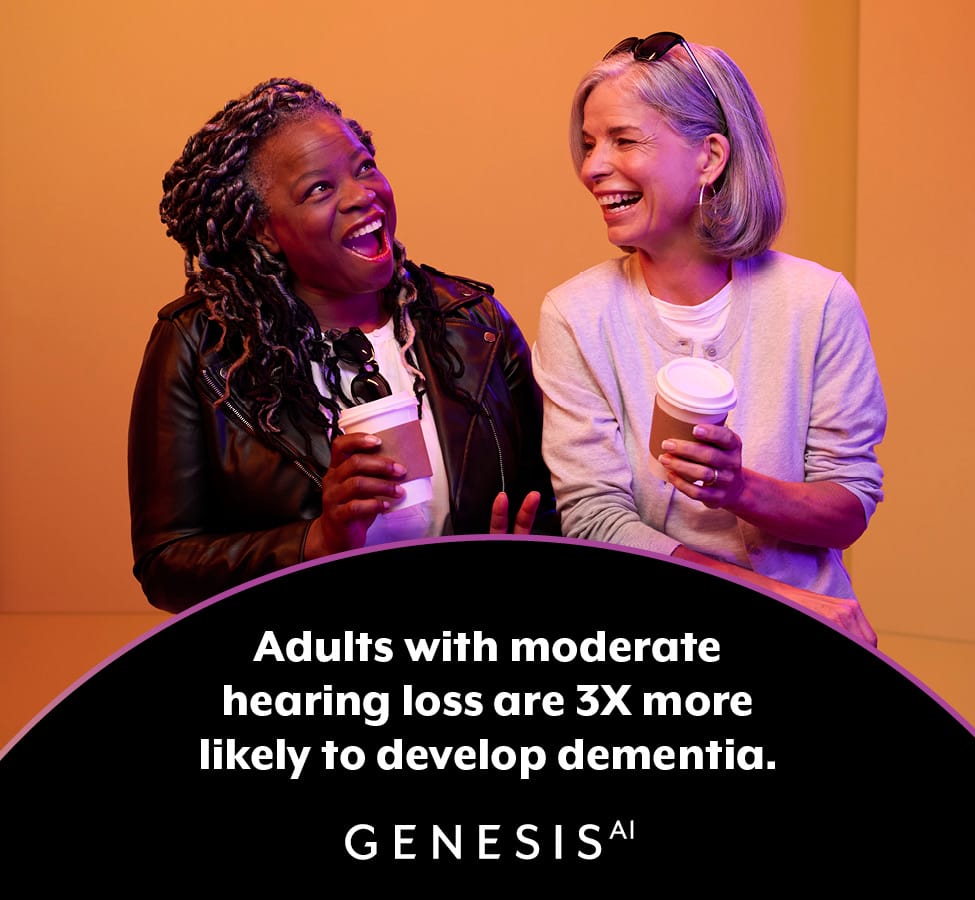What is the connection between hearing loss and dementia?
Dementia cannot yet be cured. Instead, symptoms can be managed with medication and cognitive health worked on by taking part in structured cognitive activities. Research has identified however, that as much as 40% of dementia cases could be prevented or delayed by addressing certain risk factors, with hearing loss being the most significant risk factor in mid-life (Livingston et al, 2020).
There are certain theories regarding the relationship between hearing loss and dementia:
- A lack of hearing stimulation caused by hearing loss may lead to accelerated brain atrophy (decrease in size). An ongoing study by Lin et al (Resnick & Ferrucci, 2014) discovered abnormally accelerated brain atrophy in those with hearing loss compared to those with normal hearing.
- Hearing loss is linked with social isolation, loneliness and depression which are recognised risk factors for developing dementia.
- A hearing loss could lead to the brain being overworked through straining to hear. Having to work harder on hearing means the brain has less capacity to spend on other tasks.
For these reasons, the early identification and management of hearing loss is considered crucial (WHO, 2021).
Dementia and hearing aids
Evidence indicates that wearing hearing aids plays a role in protecting against dementia and is therefore actively encouraged (Livingston et al, 2020).
Wearing hearing aids can make communicating in social activities easier. An individual is therefore more likely to engage and participate, providing more stimulation to the brain. The brain is less likely to become overworked if it is receiving information it can understand. Hearing well leads to a healthier and better quality of life.
Using hearing aids should be as simple as possible
It’s important to remember that hearing aids are not just important as a preventative measure for dementia, they are also crucial for individuals already diagnosed with dementia and hearing loss. Imagine how much a hearing loss would further increase confusion, disorientation and emotional distress.
There are a number of things to consider and get right when selecting a hearing aid and this couldn’t be more important for someone living with dementia. Here at Private GP Clinic we spend as much time as is needed to match the hearing aid to the person. Here is a list of some things that can be beneficial for a hearing aid user who is living with dementia:
- Rechargability – changing disposable batteries can be fiddly, confusing and form a barrier to hearing aid use. Even carers sometimes forget to change a battery and a hearing aid user might be sat with a dead hearing aid in their ear.
- Handling – some hearing aids are easier to handle than others. A very popular hearing aid style for individuals with dexterity trouble is the rechargeable in-the-ear model, such as the Signia Insio Charge & Go AX. This style is typically easy to insert and remove and the Signia Insio charger offers contactless charging removing the need for lining up charging contacts.
- Maintenance – a hearing aid that requires minimal maintenance is key to success. The rechargeable in-the-ear does not need a change of battery or dome. An occasional brush of the microphone inlets and wax guard (a small filter that prevents wax entering the speaker) replacement should be sufficient.
- Family/carer involvement – to ensure an individual with dementia is successful using hearing aids a good support system should be in place. Family/carers can help with hearing aid maintenance and checking that hearing aids are correctly inserted and being used. Starkey really paved the way when it came to involving family and carers with their ‘Hear Share’ app. This innovative app allows hearing aid users to share specific information with family such as hearing aid usage and social engagement whilst remaining independent. Thanks to on board motion sensors, Starkey Genesis AI hearing aids can detect when a user has had a fall and automatically alert a relative. For more move on home page.
References:
Deal, J.A., Reed, N.S., Kravetz, A.D., Weinreich, H., Yeh, C., Lin, F.R. & Altan, A. (2019). Incident hearing loss and comorbidity. A longitudinal administrative claims study [online]. Available from https://jamanetwork.com/journals/jamaotolaryngology/fullarticle/2714050 [Accessed 17 May 2024].
Dementia Statistics Hub (n.d.). Statistics about dementia: prevalance [online]. Available from https://dementiastatistics.org/statistics-about-dementia/prevalence-2/ [Accessed 17 May 2024].
Livingston, G. et al (2020). Dementia prevention, intervention, and care: 2020 report of the Lancet Commission [online]. Available from: https://www.thelancet.com/article/S0140-6736(20)30367-6/fulltext [Accessed 17 May 2024].
Resnick, S. & Ferrucci, S. (2014). Hearing loss linked to accelerated brain tissue loss [online]. Available from https://www.hopkinsmedicine.org/news/media/releases/hearing_loss_linked_to_accelerated_brain_tissue_loss_ [Accessed 17 May 2024].
World Health Organization. (2023). Deafness and hearing loss [online]. Available from: https://www.who.int/health-topics/hearing-loss#tab=tab_1 [Accessed 17 May 2024].
